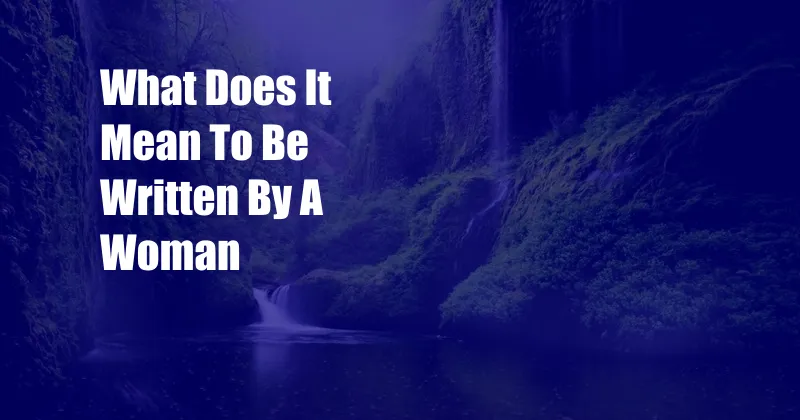
What Does It Mean to Be Written by a Woman?
In the literary world, the phrase “written by a woman” has long carried certain connotations. Historically, female authors have faced unique challenges and biases, shaping the way their work is perceived and interpreted.
But what does it truly mean to be written by a woman? Is it simply a matter of gender, or does it encompass something deeper? In this article, we’ll explore the multifaceted nature of literature written by women, examining its history, its impact, and the ways in which it continues to shape our understanding of the world.
The Concept of Women’s Literature
The term “women’s literature” emerged in the 19th century as a way to categorize works written by and for women. These works often dealt with themes of love, marriage, family life, and social expectations, reflecting the limited roles that women were expected to play in society.
However, the concept of women’s literature is not merely about subject matter. It also encompasses a distinct sensibility, a way of perceiving and interpreting the world that is often informed by the experiences and perspectives of women. Women’s literature often challenges societal norms, explores female subjectivity, and provides a voice to those who have been marginalized.
Historical Influences and Gender Bias
Throughout history, female authors have faced numerous obstacles and prejudices that have influenced their work. From lack of education and publishing opportunities to censorship and critical dismissal, women have had to navigate a literary landscape that was often hostile to their voices.
As a result, women’s literature has often been characterized by a sense of rebellion and a determination to break free from restrictive conventions. Authors such as Jane Austen, Virginia Woolf, and Margaret Atwood have used their writing to critique societal expectations and to explore the complex inner lives of women.
Contemporary Trends and Perspectives
In recent decades, women’s literature has undergone a significant transformation. Female authors are now more visible and celebrated than ever before, and their work encompasses a wider range of themes and perspectives than ever. Contemporary women’s literature often explores issues of identity, sexuality, race, and class, reflecting the increasingly diverse and inclusive nature of our society.
Authors such as Chimamanda Ngozi Adichie, Zadie Smith, and Roxane Gay are pushing the boundaries of women’s literature, challenging traditional notions of gender and representation. Their work is sparking important conversations about intersectionality, feminism, and the power of storytelling.
Tips for Enhancing Your Understanding of Women’s Literature
To fully appreciate and understand women’s literature, it is important to approach it with an open mind and a willingness to engage with its complexities. Here are a few tips:
Read widely: Explore works by women authors from different cultures and historical periods to gain a broad perspective on the diversity of women’s experiences.
Consider the context: Understand the social and cultural forces that have shaped the work you are reading. This will help you appreciate its historical significance and its relevance to contemporary issues.
Frequently Asked Questions (FAQs)
- Q: Is all literature written by women considered women’s literature?
A: Not necessarily. Women’s literature refers specifically to works that explore women’s experiences and perspectives, often challenging societal norms and expectations. - Q: Why is it important to read women’s literature?
A: Reading women’s literature provides diverse perspectives, challenges stereotypes, and empowers women’s voices. - Q: What are some common themes in women’s literature?
A: Love, marriage, family life, social expectations, female subjectivity, feminism, and intersectionality.
Conclusion: The Enduring Power of Women’s Literature
In an ever-evolving literary landscape, women’s literature continues to hold a unique and powerful place. By providing a platform for women’s voices and perspectives, it enriches our understanding of the human experience and challenges us to question societal norms.
Whether you are a seasoned reader or new to the world of women’s literature, I encourage you to embrace its diversity and engage with its transformative power. Are you ready to delve into the compelling narratives and thought-provoking ideas that women writers have to offer?